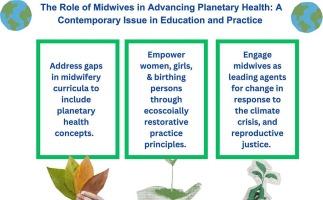助产士在促进全球健康方面的作用:教育和实践中的当代问题
IF 4.2
2区 医学
Q1 EDUCATION, SCIENTIFIC DISCIPLINES
引用次数: 0
摘要
当今最紧迫的挑战来自人与地球之间破裂的关系,导致了身体、情感和生态的连锁伤害。这些中断对妇女和性别多样化的产妇的影响尤为严重,她们往往面临环境退化、社会和种族不平等以及护理方面的系统性差距等多重负担。助产士在应对影响这些人口的人类世相互关联的挑战方面具有独特的地位;然而,要发挥这一潜力,就需要在助产实践和教育中加强全球卫生教育和实践能力。解决目前在课程、护理标准和政策障碍方面的差距,对于使助产士具备实施符合文化和生态的干预措施所需的系统思维方法至关重要。长期的文化传统和科学研究都肯定了人与生态系统之间健康关系的价值和重要性。这些关系促进了与自然的重新联系,支持积极的生活方式改变,并加强了社会凝聚力。行星健康是一个统一的概念和不断发展的社会运动,承认人类健康和地球系统健康的相互依存关系。由行星健康联盟(PHA)于2021年制定的行星健康教育框架(PHEF)提供了一种全面的方法来修订课程,以包括行星健康,并确保未来的从业者具备促进最佳健康和治疗的能力和技能。将地球健康知识纳入助产教育,对于培养能够全面应对这些相互关联的挑战的从业人员至关重要,既能支持妇女和分娩个体的福祉,又能促进她们所依赖的生态系统的健康。目的本文的目的是为将地球健康纳入助产教育提供见解和战略,支持教育工作者培养助产士,以应对妇女和性别多样化的分娩人员以及地球系统的复杂、相互关联的需求。作者强调助产士在促进全球健康方面发挥着至关重要的作用,因为她们有独特的能力,通过知识、宣传和培养个人和集体机构,赋予妇女、女孩和所有性别多样化的分娩人员权力。本文章由计算机程序翻译,如有差异,请以英文原文为准。

The role of midwives in advancing planetary health: A contemporary issue in education and practice
Problem
Today's most pressing challenges arise from fractured relationships between people and the planet, resulting in cascading physical, emotional, and ecological harms. These disruptions disproportionately affect women and gender-diverse birthing people, who often face the compounded burdens of environmental degradation, social and racial inequities, and systemic gaps in care. Midwives are uniquely positioned to respond to the interconnected challenges of the Anthropocene impacting these populations; however, advancing this potential requires strengthened planetary health education and practice competencies within midwifery practice and education. Addressing current gaps in curricula, fragmented standards of care, and policy barriers is essential to equip midwives with the systems-thinking approaches needed to implement culturally responsive, ecologically attuned interventions.
Background
Both longstanding cultural traditions and scientific research affirm the value and importance of healthy relationships between people and ecological systems. These relationships foster a reconnection with nature, support positive lifestyle changes, and strengthen social cohesion. Planetary health is a unifying concept and growing social movement that acknowledges the interdependence of human health and the health of Earth's systems. The Planetary Health Education Framework (PHEF), developed by the Planetary Health Alliance (PHA) in 2021, provides a comprehensive approach in revising curricula to include planetary health and ensure future practitioners are equipped with the competency and skills to advance optimal health and healing. Integrating planetary health knowledge into midwifery education is essential to prepare practitioners who can address these interconnected challenges holistically, supporting the well-being of women and birthing individuals while also advancing the health of the ecosystems they depend on.
Aim
The purpose of this paper is to offer insights and strategies for integrating planetary health into midwifery education, supporting educators in preparing midwives to respond to the complex, interconnected needs of women and gender-diverse birthing people and the Earth's systems. The authors emphasize the vital role midwives play in advancing planetary health, given their unique ability to empower women, girls, and all gender-diverse birthing persons through knowledge, advocacy, and the fostering of individual and collective agency.
求助全文
通过发布文献求助,成功后即可免费获取论文全文。
去求助
来源期刊

Nurse Education Today
医学-护理
CiteScore
6.90
自引率
12.80%
发文量
349
审稿时长
58 days
期刊介绍:
Nurse Education Today is the leading international journal providing a forum for the publication of high quality original research, review and debate in the discussion of nursing, midwifery and interprofessional health care education, publishing papers which contribute to the advancement of educational theory and pedagogy that support the evidence-based practice for educationalists worldwide. The journal stimulates and values critical scholarly debate on issues that have strategic relevance for leaders of health care education.
The journal publishes the highest quality scholarly contributions reflecting the diversity of people, health and education systems worldwide, by publishing research that employs rigorous methodology as well as by publishing papers that highlight the theoretical underpinnings of education and systems globally. The journal will publish papers that show depth, rigour, originality and high standards of presentation, in particular, work that is original, analytical and constructively critical of both previous work and current initiatives.
Authors are invited to submit original research, systematic and scholarly reviews, and critical papers which will stimulate debate on research, policy, theory or philosophy of nursing and related health care education, and which will meet and develop the journal''s high academic and ethical standards.
 求助内容:
求助内容: 应助结果提醒方式:
应助结果提醒方式:


